Previous: Part 1
View this post on InstagramAll the ahadith references from sunnah.com are embedded in the (green) hadith text (The purple underlined text means a resource link is embedded in it). These are not COMPLETE ahadith, but (short and) complete set of Arabic instructions taken from ahadith.
Hopefully, you have memorised the tiny excerpts of ahadith from the previous lesson. This “Mini Ahadith Series” will help you memorize parts of ahadith (or full ahadith) one by one. We will start from two and gradually progress to more words in shaa Allaah. This is the second part of the 2-word ahadith series. These ahadith will also help you to teach your kids a few Islamic manners and while disciplining them, you can always use Arabic words instead, so they can get the hang of this beautiful language.
NOTE:
- Meanings of the root words have been taken from http://www.studyquran.co.uk/PRLonline.htm and Arabic dictionary.
- Some audios have been recorded by a 3 year old while some by a 4 year old girl.
1. Correct intentions
While teaching children about how important an intention is behind every effort and every deed, you may recall this beautiful hadith of Prophet Muhammad صلى الله عليه وآله وسلم :
الأَعْمَالُ بِالنِّيَّةِ
{ Transliteration: Al Aa’maalu Bin-niyyah }
{ Translation: “The (reward of) deeds depend on intentions” }
Root Words:
The word “Al Aa’maalu” has been derived from three root words ع م ل (Ayn-Miim-Lam) which means to do/make/act/work/operate/perform/construct/manufacture, practice a handcraft, be active, one who does.
This word has been used several times in the Qur’an. For example [2:25], [2:277]
The word “Niyyah” is the Arabic word for intention, and it is derived from the letters ن و ي (Nun-Waw-Ya). From the same root we find the word nawāh, meaning, amongst many other things, date pit, fruit kernel and core. From this, we understand that the intention belongs to the innermost core of the human being and that intentions are more important than actions.
It has occurred only once in Quran in [6:95] where the meaning is used as the date-seed.
Practical Application:
2. Worship Allah – The Most Merciful
Teaching children about the purpose of our life, you can always mention this part of the (linked) hadith:
اعْبُدُوا الرَّحْمَنَ
{ Transliteration: a’budur Rahman }
{ Translation: “worship Ar-Rahman (The Most Merciful)” }
Root Words:
The word “a’budu” has been derived from three root words ع ب د (aeen-baa-Dal) which means: to serve, worship, adore, obey with submissiveness or humility, approve, apply, devote etc.
Example of this word in the Qur’an is Surah Fatiha [1:5]
The word “Rahman” has been derived from three root words ر ح م (Raa-Haa-Meem) which means a womb (i.e. place of origin), a connection or tie of relationship. “Rahman” is an active participle noun in the measure of fa’lan which conveys the idea of fullness and extensiveness in terms of mercy. Mercy encompasses things like favour, benefit, forgiveness, tenderness and love.
The biggest example of this word is BISMILLAH [1:1]
Practical Application:
Whenever my eldest is saying random things (for eg: lalala lalala laaaalllaaa) while drawing, I remind her to perhaps let her kiraaman kaatiebeen (the angels who are recording our words and deeds) write something meaningful. You can use “a’budur Rahman” to remind the kids – that they can keep their tongue moist with dhikr of Allah instead of saying things mindlessly (things that aren’t bringing them any joy in dunya nor any benefit in aakhirah).
3. Feed others
Encouraging children about helping the needy (especially while they are fasting in Ramadan – to help them feel the reason behind feeding more strongly), you may say:
أَطْعِمُوا الطَّعَامَ
{ Translation: “feed others” [In another hadith: “offer food (to the needy)” }
Root Words:
If you take it literal, then it simply means “feed the food”. The word “it’imu” and “ta’aam” – both come from the same root words – ط ع م (Tay-Ayn-Miim) which means to taste/swallow, to flavour/savour, appetite/desire, to feed/supply, way of eating, food/meal, cultivate, ripened fruit, good state/condition in respect of food, one who feeds much, place of eating etc.
This word has been used several times in the Qur’an. For eg: [36:47]
Practical Application:
If you ever get a chance to see homeless people or those who are begging, it’s best to offer them food in front of your children so they learn the importance of helping others and you can encourage your children by saying “At’imu ta’aam”. You can even use it among siblings – perhaps asking the elder child to feed the younger one – giving them a sense of responsibility and an opportunity to do a good deed.
4. Spread Salam
Teaching children about peace and conflict resolution, this is a great way to start a conversation – you may say:
أَفْشُوا السَّلاَمَ
{ Translation: “Spread (the greeting of) Salam (peace)” }
Root Words:
The word “salam” has been derived from three root words س ل م(Siin-Lam-Miim) which means safety/security/freedom/immunity, to escape, salutation/greeting/peace, deliver/acknowledge, pay in advance, submit, sincerity, humility, submission/obedience, resign/quit, to be in sound condition, well without blemish, gentle/tender/soft/elegant.
This word has been used several times in the Qur’an. For eg: [5:16]
Practical Application:
You know that time when you greet someone and your child is standing lifeless :p You look at them with an expectation that they will be polite enough to say Salam as well, but they are still standing there lost in thoughts 😅 That’s the time you use this line!
5. Eat with your right hand
Teaching children about the importance of using their right hand, you may say:
كل بيمينك
{ Translation: “eat with your right hand” }
Root Words:
The word “Kul” has been derived from three root words أ ك ل (Alif-Kaf-Lam) which means swallowing food after chewing, means of subsistence, devoured/consumed, fed/supplied, to eat/gnaw, things to be eaten, eatables.
This word has been used several times in the Qur’an. For example: [2:265]
Practical Application:
Whenever your child sits down to eat, you can remind them to use their right hand by saying “kul bi yameenik”. Or you can even use “bi yameenik” only if you just want to remind them to use their right side (hand or foot).
You can also add the first part of this hadith along with it as a reminder – سم الله (Mention Allah’s Name (i.e., say Bismillah before starting anything good). Whenever my kids are about to drink water or eat or do anything really, I do remind them to say bismillah by simply saying “Bismillah” out loud. You can use “sammillah” too (since that is an instruction – fi’l amr). The word “sammi” comes from 3 root words – أ س م (alif/hamza-Sin-meem) which means name. This word has been used several times in the Qur’an before each surah – bismillah ir rahman ir raheem ((I start) with the name of Allah, the Merciful and Compassionate).
6. Start with your right
The same parts of the above example applies here too (but if it’s something other than eating, you can use this phrase instead):
فابدؤا بأيمانكم
{ Transliteration: fabda’u bi-aymaanikum }
{ Translation: “Begin with your right side” }
7. Eat Together
Teaching children about the beauty and barakah of eating together, you can always say:
كُلُوا جَمِيعًا
{ Translation: “Eat together” }
Root Words:
The word “Kuloo” has been derived from three root words أ ك ل (Alif-Kaf-Lam) which means swallowing food after chewing, means of subsistence, devoured/consumed, fed/supplied, to eat/gnaw, things to be eaten, eatables.
This word has been used several times in the Qur’an. For example: [6:141]
The word “Jamee’aa” has been derived from three root words ج م ع (Jeem-Meem-Ayn) which means to collect or gather, bring together, to contract, assemble or congregate, unite or connect/ form a connection, bring into a state of union, reconcile or conciliate
This word has been used several times in the Qur’an. For example: [6:35], [18:99]
Practical Application:
I find myself repeating this phrase often with the kids – usually mixed with other languages (English and Urdu):
Since “laa tafarraqu” can be used beyond eating as well, you can use it with multiple kids to remind them to stick together to each other. “laa tafarraqu” as they play in the park or they form a line or you go in a crowded place. It basically means do not separate. Then whatever concept you use it with, works.
8. Straighten rows
Teaching children to straighten rows in prayer and outside, you can always say:
سَوُّوا صُفُوفَكُمْ
{ Transliteration: Sawwoo Sufufakum }
{ Translation: “Straighten your rows” }
Root Words:
The word “Sawwoo” has been derived from these three root words س وى (Seen-Waw-Ya) which means to be equivalent, be equal. The verb used is in the form of a command and is derived from the second form of this verb in which the second radical, namely Waw, in this case is doubled. The meaning of the verb in the second form, changes from to be equal to even, level, flatten, straighten. The verb has gone from describing a state of being, namely being equal, straight, to the act of performing it, to straighten, to become equal. When changed to the verb of command, as present in the Hadith, it means “Straighten.”
This word is used extensively in Quran. For example: [32:4], [22:25]
The word after “Sawwoo” is a combination of the word “Sufoof” (plural) meaning rows and “Kum” (suffix) meaning “your”. It is a personal pronoun which is used to refer to a group of people.
The word “Sufoof” has been derived from root words ص ف ف (Saad-Fa-Fa) which means evenly, side by side, laid out, a rank/row/line, in order. As it has fathah on the last letter, it indicates that the word is the object of the verb “Straighten.”
Example of this word can be found here [78:38] in the Qur’an.
Practical Application:
“Sawwuu sufufakum” is a phrase I only get to use on Fridays when we take all the kids to the mosque. They form a line even when going to the mosque so the 5 of them don’t get lost 😅 and when the imam says “sawwuu sufufakum”, I repeat it to them to make sure they are in line with me (I try to stand in the corners so children don’t disturb the congregation from the middle of the line).
9. Make room for others
Teaching children about the importance of facilitating and accommodating others and thus adjusting according to the requirement, you can always say:
تَفَسَّحُوا وَتَوَسَّعُوا
{ Translation: “Make room and spread out” }
Root Words:
The word “Tafassahu” has been derived from three root words ف س ح (Fa-Sin-Ha) which means to be spacious, make room for, make long strides. to be wide/broad, enlarge, take one’s ease in (a place).
This word has been used in the Qur’an in Surat Al-Mujādila [58:11]
The word “Tawassa’u” has been derived from three root words و س ع (Waw-Siin-Ayn) which means to be ample, comprehend, embrace.
Practical Application:
Whenever kids are sitting in a car or everyone is sitting down to eat together on the floor. Or when we are going to do an activity together or read together, I have to remind them “Tafassahu wa Tawassa’u” – make space for your sister and you’ll be rewarded in shaa Allah. Some days when kids argue over one spot – when both of them (or all of them) want to sit or lie down in one place then I remind them this hadith. Tafassahu wa Tawassa’u!
10. Exchange gifts
Teaching children about the value and purpose of sharing gifts, you can always remind them of this hadith:
تَهَادُوا تَحَابُّوا
{ Transliteration: tahaadu tahaabu }
{ Translation: “Give gifts and you will love one another” }
Root Words:
The word “Tahaadu” has been derived from three root words ه د ي (ha-Dal-Ya) which has following meanings: to guide/direct to the way, take/follow right way/course, rightly guided/directed, a way/course/method/mode/manner of conduct, gift.
Example of this word in the Qur’an is [2:185]
The word “Tahaabu” has been derived from three root words ح ب ب (Ha-Ba-Ba) which means to be loved/beloved, affected/liked/approved, be an object of love, lovely/pleasing/charming, take pleasure in a thing, stand still or stop, be fatigued or tired, form a thing into something else, fill a thing (with water or drink), become clotted/form a clot, form or break out with pimples/bubbles/small pustules. To love, like, wish.
Example of this word in the Qur’an is [2:165]
Practical Application:
When kids don’t want to share or want all the things for themselves, then I tend to repeat this hadith to them. “Tahaaddu tuhaabbu baby!” Allah will increase love between you like this. And Allah gets happy with those who love each other for His sake. So much so that He will shade you in aakhirah when no one else will be shaded.
11. Sincerity and consistency
Teaching children about productivity (which is all about consistency in good deeds done with sincerity), you may say:
سَدِّدُوا وَقَارِبُوا
{ Translation: “Do good deeds properly, sincerely and moderately” }
Technically these are 3 words if you count “wa” too, but it’s easier because the focus is only 2 new words.
Root Words:
The word “saddidu” has been derived from three root words س د د (Siin-Dal-Dal) which means to be straight to the point, hit the right point, speak or act rightly, be well directed, right thing, true, just.
This word has been used several times in the Qur’an. For eg: [33:70]
The word “qaaribu” has been derived from three root words ق ر ب (Qaf-Ra-Ba) which means to be near to, approach, offer, be near in relationship or rank, be at hand, draw near. (qurbatun) – proximity, means of drawing nigh, kindred, relationship. (qurubatan (pl. qurubatun)) – pious works and good deeds which draw people near to Allah, means by which an approach is sought. (qurban) – sacrifice, offer made for God, means of access to God. (aqrabu) – closer, closest. (aqrabun) – kinsfolk, kindred, those most nearly related. (muqarrabun) – one who is made or permitted to approach, who is brought near.
This word has been used several times in the Qur’an. For eg: [5:27]
Practical Application:
You can use this if you see kids doing anything halfheartedly. Teach them to instill ihsan in whatever they do. Doing less, but giving their best is important. For eg: they prayed quickly or only part of it to get away with it, you can remind them by saying “saddidu wa qaaribu”.
If you or your kids memorize these ahadith, please let everyone know in the comment section below how much time you or your kid took to learn them so others can also be encouraged to learn in shaa Allah!





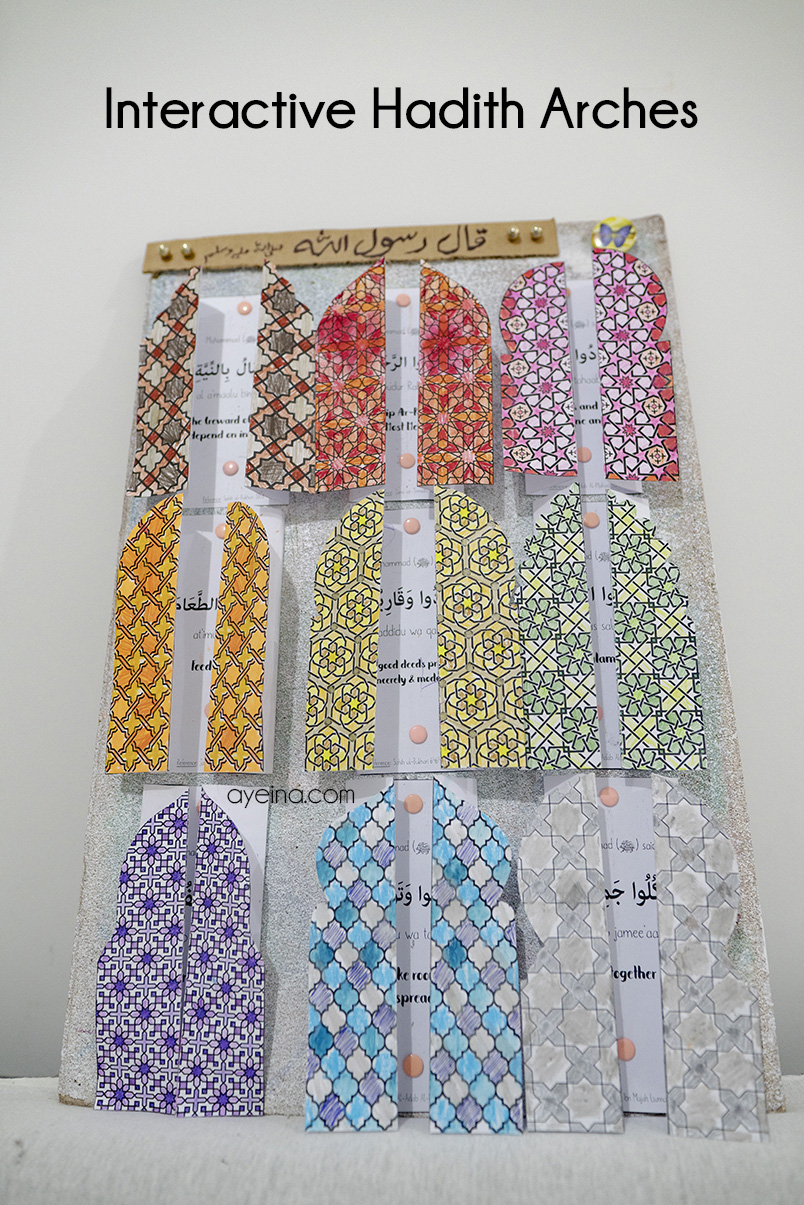
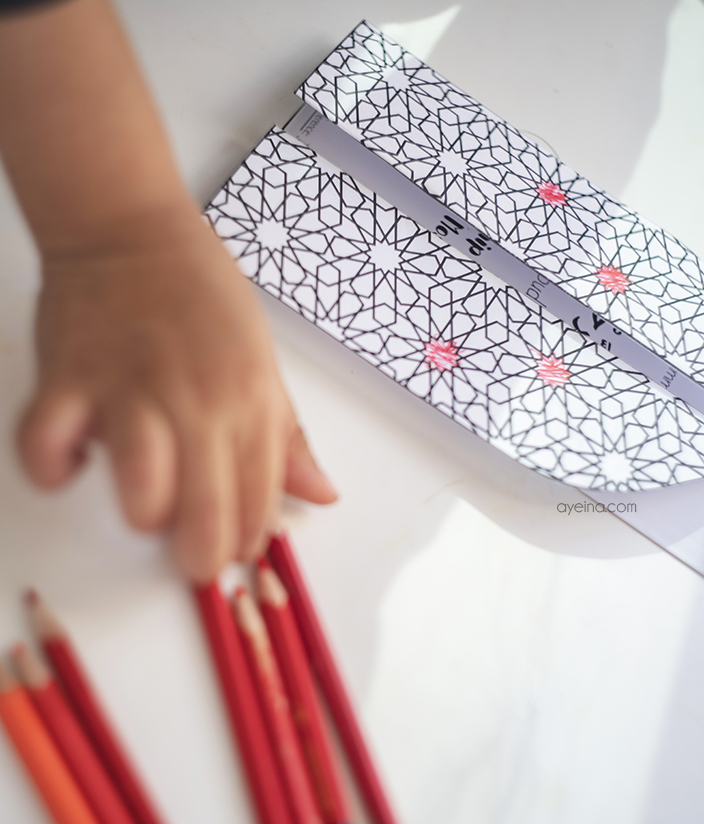
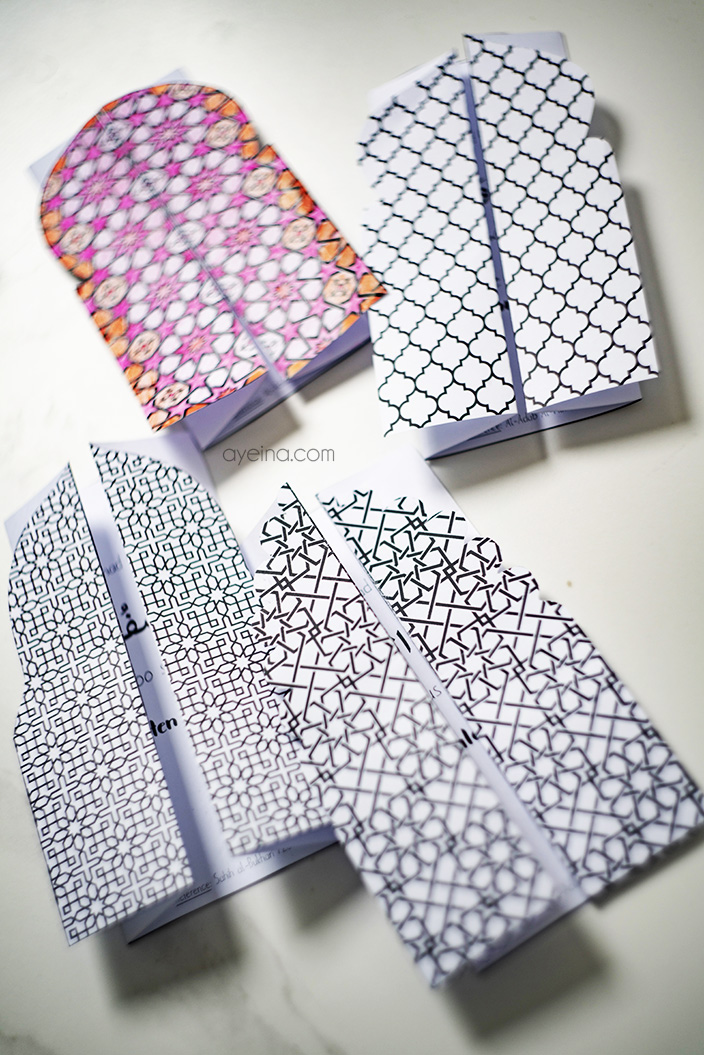
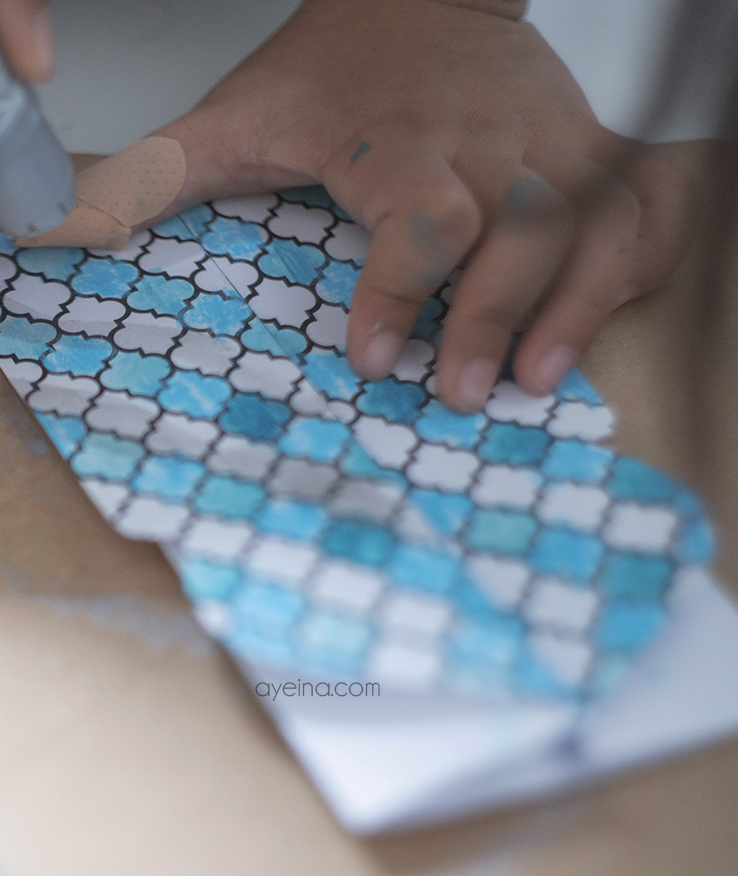
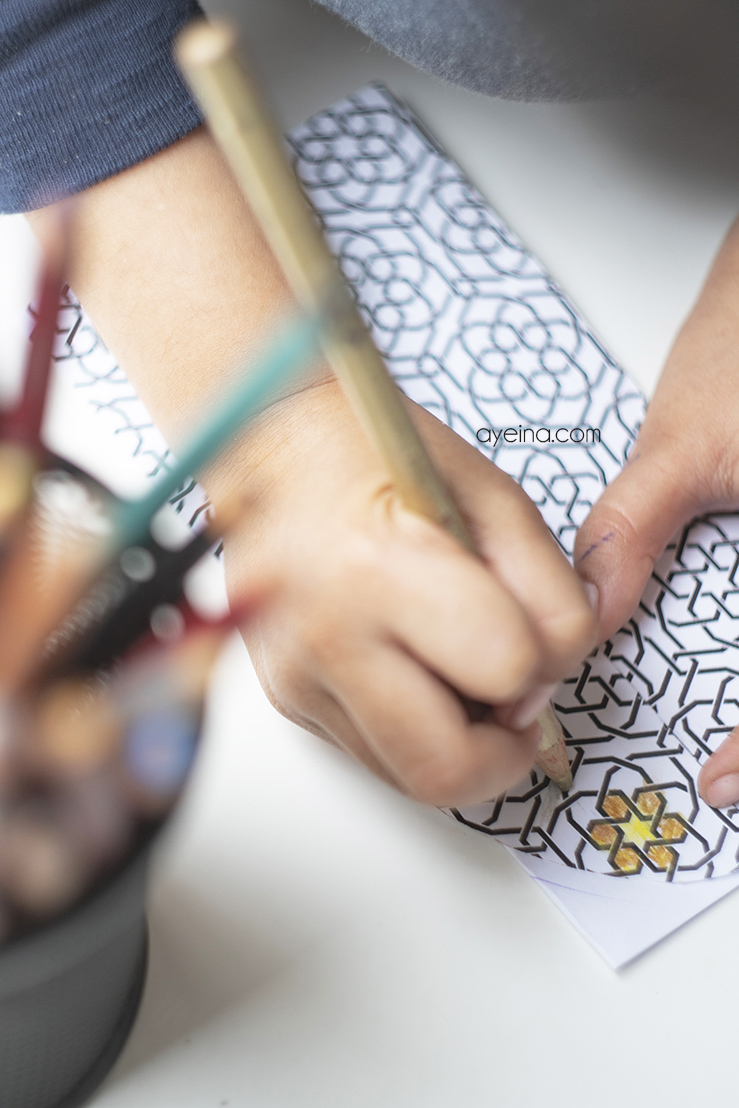
I was looking forward to this post. Its so educational. Thanks for putting in the effort to share these Arabic terms with your readers.
jazakillahu khair fatima 🙂
JazakAllahu Khair for this, I love how you’ve also added the Arabic way of saying it!
waiyyaki sainab 🙂
This is going to be so helpful to me, Jazakallah Khair for taking the time to put this together. May Allah reward you abundantly!
In sha Allaah shahnaaz! 🙂
Waiyyaki habibti 🙂
This is so educational ! thank you for adding the right pronunciation…
Jazakillahu khair lady 🙂 may it be helpful as well 🙂
SubhanAllah……this is so useful…thank you for sharing…
Jazakillahu khair lubna 🙂
MashaAllah beautifully composed article. May Allah reward you with the best in life and hereafter.
Aameen. Wa jazakillahu khair khadijah 🙂
Love the images you have, such quick and easy reminders!
Jazakillahu khair Rubina 🙂
Jazakillahu khair for posting this beautiful and easy to memorize hadiths, this would be of help to my child as he will present a muhadarah to represent their class. As a revert I don’t have so much knowledge about hadith especially the pronunciation of every word in Arabic.
Barakallahu feeki sister.
Our pleasure sis! We have extended this into a whole set of 3 books actually, which shall be published soon in shaa Allah! Need duas <3 Allahumma baarik!
Mashallah, these are excellent lessons for growing Muslims.
Indeed they are! For these are the words of our beloved prophet Muhammad s.a.w. Alhamdulillah 🙂
Wa jazakillahu khair zainab! 🙂
Masha’Allah another great lesson for the young ones. In sha Allah many will benefit
In sha Allaah! 🙂
Loved the post. The practical examples you quoted from your own experience are very inspiring. Please try to add those with every hadith. Will practice with my family in sha Allah!
May Allah accept from you.
VAllah aap ko jaza de Amin
Saddidu wa qaaribu
Do good deeds properly, sincerely and moderately
Thanks for this and I also want to see your improvement like 100 Hadith with their translation.